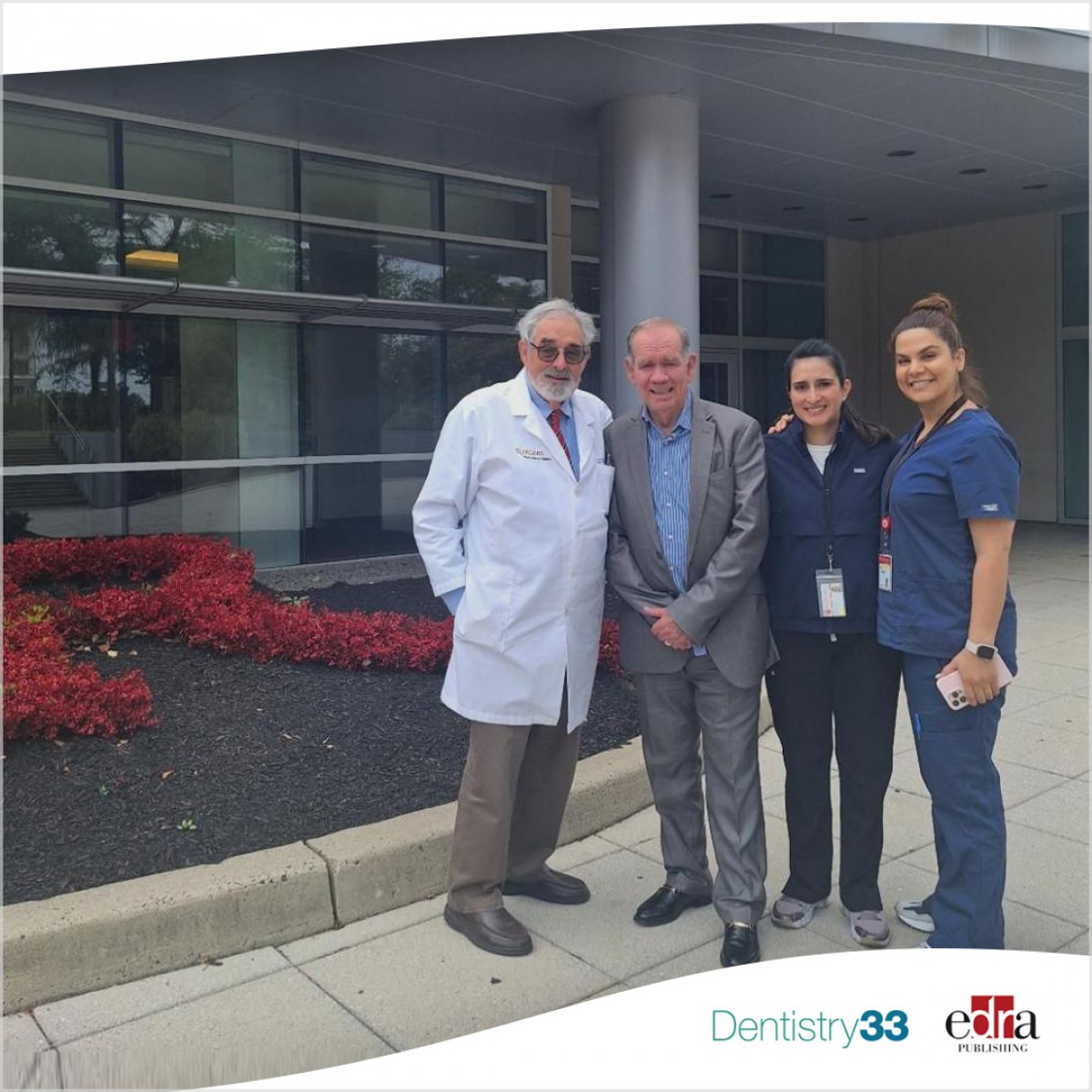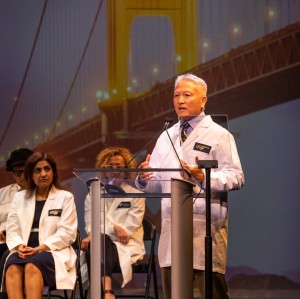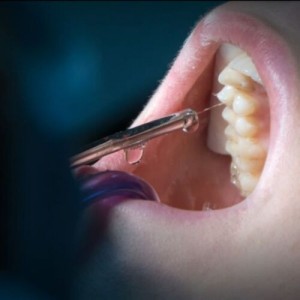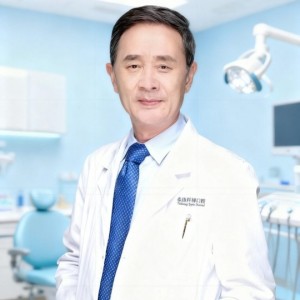
Rutgers team treats patient suffering from trigeminal neuralgia
By Kardelen Koldas, Rutgers School of Dental Medicine
A minute of excruciating pain feels like a lifetime. Imagine experiencing bolts of painful attacks for 20 years. This was Alberto Gracia's reality until he came to Rutgers School of Dental Medicine's (RSDM) Center for Temporomandibular Disorders and Orofacial Pain.
"It was so horrible," said Gracia, a 72-year-old pastor from Cuba, through Ana Baldizon, an oral medicine preceptorship at RSDM who became Gracia's translator.
Gracia had trigeminal neuralgia. It's a condition where the trigeminal nerve—responsible for sensation to the face—is contacted by a blood vessel. This creates episodic electric-like shock pain that can be triggered by a light touch, eating, drinking, putting the head down on a pillow, or even breezy weather. Each episode can last from a few seconds to as long as 15 minutes.
The debilitating pain, also referred to as tic douloureux or painful grimace, affects daily activities as well as speech. And half the time, trigeminal neuralgia is misdiagnosed, leading patients to unnecessary root canals, extractions, and even sinus surgeries. A correct diagnosis can take 10-12 years unless patients see a pain specialist.
Gracia came to RSDM's Center for Temporomandibular Disorders and Orofacial Pain during one of his painful attacks. As soon as first-year orofacial pain resident Zahra "Sami" Sarabadani saw him, she suspected trigeminal neuralgia (TN).
"It's really hard for us to diagnose and differentiate between TN and even a dentin sensitivity," she said. But Gracia's clinical presentation was an eminent marker for the condition. Sarabadani personally took him for an MRI and pushed for a quick scan, confirming the diagnosis of a vascular contact of the trigeminal nerve.
"It was like two pieces of pipe laying on each other at Home Depot," said Gary Heir '72, the Robert and Susan Carmel Chair in Algesiology and director of the Center for Temporomandibular Disorders and Orofacial Pain at RSDM.
During their first interaction, Heir noticed how Gracia looked skinny, tired, and worn out from the pain.
"A happy guy like this comes with tears coming down his face, holding his face, and he couldn't talk to us," he said. "He wrote notes in Spanish. That's how bad it was. The case is probably one of the worst cases of TN we've seen come to the clinic and was one of the best outcomes."
The team first tried medication, but there were side effects, and it couldn’t prevent the breakthrough of pain. Gracia required surgery. Heir promptly referred him to Dr. Stephen Johnson, a neurosurgeon, and director of facial pain and trigeminal neuralgia at Rutgers Robert Wood Johnson Medical School. The two have been collaborating on many cases, and for many years Johnson takes all orofacial students to the operating room to observe his surgeries.
“What's special about this case it is that from diagnosis to surgery, Sami followed this patient from start to finish. This is really unique,” said Heir. “There are 15 orofacial pain programs in the U.S., and I think we're the only one where the orofacial pain students can observe neurosurgery.”
Within two weeks, Gracia was in Johnson's operating room.
"Facial pain is something that we don't normally think about as something that can ruin lives," said Johnson. "Trigeminal neurology is sometimes called the suicide disease. It's incomprehensively severe pain."
Oftentimes, surgery is curative. After a one hour and 20-minute operation, Gracia woke up pain-free.
"Just to see the difference in his disposition, his smile after surgery, it's so reassuring and it's a reminder of why we do what we do," said Johnson. "Because it is life-changing surgery."
It sure was. Since the operation, Gracia has been living without pain. He regained his weight along with happiness.
"I'm simply always laughing now," he said. During Father's Day, his grandchildren noticed the change in him and commented on how he seemed younger and livelier.
I am happy, with no more pain, said Gracia, who was headed to Bolivia, his wife's home, for a trip he can finally enjoy.
"I thank God for the excellent team here" at Rutgers," he added.
Read the original story on the school's website.
 Related articles
Related articles
Prosthodontics 13 June 2025
The second part of this review, evaluating the literature on the relationship between dental occlusion and temporomandibular disorders (TMDs), focuses on the aetiological importance of tooth loss and...
Oral Hygiene & Prevention 28 November 2023
New Center Will Investigate And Discover Treatments for Temporomandibular Disorders
It has a disc in the middle and then two bony structures that articulate together to open and close the jaw. But, with all that talking and eating, the jaw joint is used more than the knee. Between 5...
The inconclusiveness and scarcity of research focusing on the association between oral behavior and painful TMD accentuates the necessity for further studies in this specific area.
Restorative dentistry 12 May 2023
Central sensitization (CS) and temporomandibular disorder (TMD) are both associated with insomnia. Therefore, the authors aimed to investigate whether insomnia was associated with more symptoms of CS...
Restorative dentistry 11 April 2023
Rutgers specialists show facial pain can be unconnected to teeth
By Andrew Smith, Rutgers University
What’s the proper treatment for constant, inexplicable pain in the face, jaw or head that defies conventional dental treatment? For one patient in a recent case study, it was the removal of a...
 Read more
Read more
Editorials 10 October 2025
With proud smiles and crisp white coats, ninety-three learners from the DDS Class of 2029 and the International Dentist Pathway Class of 2028 marked the start of their dental careers at the UCSF...
Periodontology 10 October 2025
Continuous professional development (CPD) in Periodontology refers to the overall framework of opportunities that facilitate a life-long learning practice, driven by the learner-practitioner and...
TheraBreath, the #1 alcohol-free mouthwash brand in the U.S.*, has introduced a new line of dentist-formulated, clinically tested toothpastes designed to support professional oral care...
News 10 October 2025
New officers and trustees were installed at the Minnesota Dental Association’s Leadership Conference on September 19 in Minneapolis.
News 10 October 2025
Smartee Denti-Technology today announced that Professor Gang Shen, its Chief Scientist and Executive President of TaiKang ByBo Dental, has once again been named to the World’s Top 2% Scientists...















